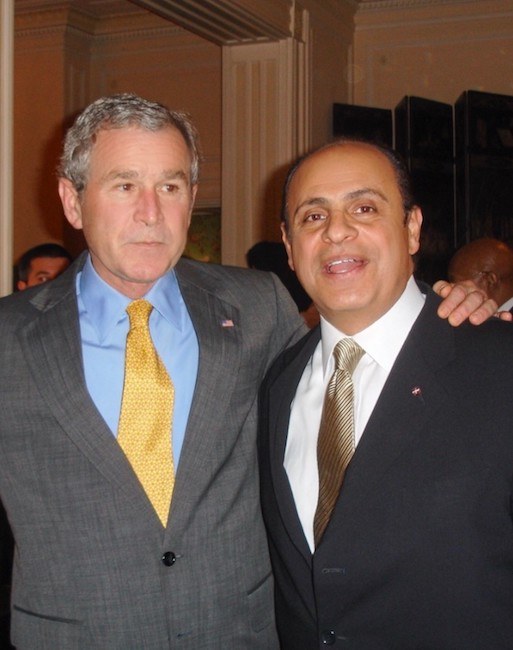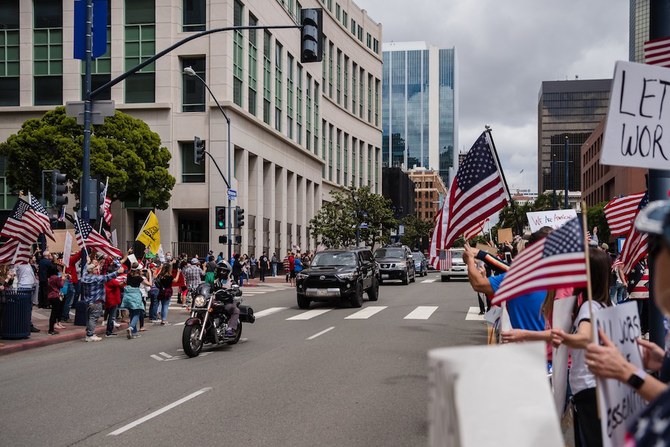NEW YORK CITY: The threat of COVID-19 has propelled new cadres of health experts into the public eye. Audiences are desperate for a glimmer of hope in a doctor’s reassuring words that tell of a treatment that works, or a vaccine study picking up much-needed speed.
Dr. Talal Nsouli has suddenly found himself much in demand. Director of the Watergate and Burke Allergy and Asthma Centers in Washington DC, he was the personal allergist of Bill Clinton, as well as a consultant to the former president’s successors George W. Bush, Barack Obama and now Donald Trump.
“My father is the most important person in my life,” Nsouli told Arab News. “He was interested in science and always spoke from the bottom of his heart without hiding anything, which is both good and bad, because you know how things are in life.”
Nsouli has taken after his father. It does not take much insight to realize that his outspokenness is akin to that of an innocent child.
Born in Mexico to Lebanese parents, he grew up with an idyllic image of Lebanon that seems to remain in his consciousness untarnished by the civil war and the following tumultuous years leading up to the country’s recent economic collapse.
“My father always told me Lebanon was the ideal place to live.” After a pensive pause, he repeated, loading his words with more conviction: “The ideal place to live. It’s a country of culture, beautiful beaches and mountains. But most of all, the family is there.”
Nsouli had a “fantastic experience” growing up in America, where he never felt “any discrimination whatsoever. Lebanon is family values. America is simplicity.”
He became who he is by “working very hard, always looking to improve, but also donating my time to help others achieve. The key is to keep up with advances in medicine and always distinguish yourself by providing state-of-the-art medicine and customer service. We have to believe in ourselves as well.”
The conversation with Nsouli, while intensely focused on the deepest issues of our time, flows smoothly.
He has a way of making the most intricate scientific jargon accessible to anyone who wants to listen.
A few minutes into our chat, the “ineluctable guest” soon made its way into the conversation: Coronavirus.
The scientist is bemused by this invisible enemy. He rapidly runs a tally of what he knows about it so far: “The coronavirus is perfectly organized to kill people. This is like nothing we’ve seen before.”

Dr. Talal Nsouli with former Vice President Al Gore. (Supplied)
He added: “Often viruses either get to the immune system, the lungs or the liver. But this one is extremely aggressive and has the potency to address the majority of organs in the body.
“It targets the bronchial airways and destroys the two cells that allow us to breathe: Pneumocytes 1 and 2. So when the virus hits, no more oxygen, and the apparatus that brings in the oxygen collapses. This is a major disaster.
“The virus was shown to also attack the heart, causing myocarditis; the kidneys, causing kidney failure; the brain, causing encephalitis; the gastrointestinal system, causing bleeding; the liver, causing hepatitis. There’s nothing left!”
Nsouli is baffled that even such an unfathomable enemy is deterring neither Republicans nor Democrats from politicizing it, sparring over all the aspects of the fight. “I’m very disappointed that we didn’t unify,” he said.
Of all the politicized issues, perhaps the thorniest is COVID-19 treatment. In his daily press briefings, Trump has hyped hydroxychloroquine (HCQ), the anti-malaria drug, as a potential treatment, and eagerly encouraged the public to use it, asking: “What do you have to lose?”
Nsouli condemns what he termed the “billion attacks” against Trump for getting behind the drug.
“The president isn’t flipping a coin. He’s talking to the biggest experts in the world. He wants to give hope to people. And hope is important. This isn’t fake hope.”
On many of his TV interviews, Nsouli sang the praises of HCQ, triggering a flood of requests from patients to get the drug.
“Let me be clear. People misunderstood me on TV. The Food and Drug Administration hasn’t approved any drug yet for COVID-19,” he told Arab News.
But while he reiterates that all medication needs investigation, he goes on to make the case for HCQ.
“HCQ has been around for 40 years. It’s the most prescribed medication on Earth. This shows how much we know about it and how safe it is. It’s taken by people who have rheumatoid arthritis or autoimmune diseases like lupus,” he said.
“And now I’m going to convince the whole world of its efficiency: People in Africa have to take the anti-malaria vaccine or medication. As a result, what’s the death rate of coronavirus in Africa? It’s almost non-existent there!” he added.
“The virus needs a certain type of acid and alkalinity to enter and subdue our cells against us. HCQ has an effect on acidity. It stops the virus from replicating itself.
“Coronavirus causes inflammation and destroys the lungs. HCQ blocks the release of inflammatory mediators. The only potential side effect could be an irregular heartbeat, or arrhythmia.”
Studies showed that cardiovascular risks could be deadly with HCQ, and potentially increased with COVID-19 patients.
A French study detailed 43 cases of “heart incidents” tied to HCQ, warning that the drug should be administered in hospitals under medical supervision.
Most hospitals in New York and other states are not prescribing it to the ambulatory population until clinical trials can clarify who would benefit and who would be at too big a risk, according to doctors approached by Arab News.

Dr. Talal Nsouli with Democratic Presidential candidate Hillary Clinton. (Supplied)
But Nsouli is having none of it. “That’s all politics. I’d like to know if the doctors you spoke with are Republicans or Democrats. It makes a big difference,” he said.
“I agree that studies need to be done appropriately, but if you wait one year for a study to finish, the globe will disappear!” he added.
“I’d like to challenge that doctor who refuses to give patients HCQ and ask him: What else do you have to suggest? That doctor is going to tell me that he’ll put the patient in hospital, and if they get bad he’ll give them water and salt IV fluid, and if they have difficulty breathing he’ll shovel a tube in their throat, and if they still won’t breathe he’ll put them on a ventilator. You know what the ventilator death rate is? Eighty percent!
“I’ll punch that doctor in the face. I’ll tell him, ‘Shame on you! You shouldn’t be a doctor. Get the heck out of here!’”
Nsouli is calling for nothing short of a complete overhaul of the scientific approach to coronavirus.
He says politicians, academicians, legislators and researchers all need two tracks. One should be for studies, where instead of the regular 2,000 researchers, 40,000 should be hired.

Three potential coronavirus, COVID-19, vaccines are kept in a tray at Novavax labs in Rockville, Maryland on March 20, 2020, (AFP/File Photo)
The second should be an emergency track where all the medicines that have shown positive effects (Favilavir, Remdicivir, Iver Mektin etc.) could be used in the right dose, with the right patient and at the right time, “because medicine isn’t a Godiva chocolate that you dole out to people.”
Asked how this whole pandemic ordeal will change us as humans, Nsouli said: “It’s going to be a very good change. We’ll be prepared next time for this type of attack, be it natural or bioterrorist. We’ll have our own protection and masks, and won’t depend on China.”
He added: “I’m a personal friend of (former) Vice President Al Gore, but if I’m concerned about global warming and I’m ignoring a vicious bioterrorist attack that upsets the whole globe, it means I’m not thinking the right way.”
Thus we ended on a rather different note than peaceful, picturesque Lebanon and simple, blissful America. But who is immune to the fears that this pandemic continues to stoke?


























